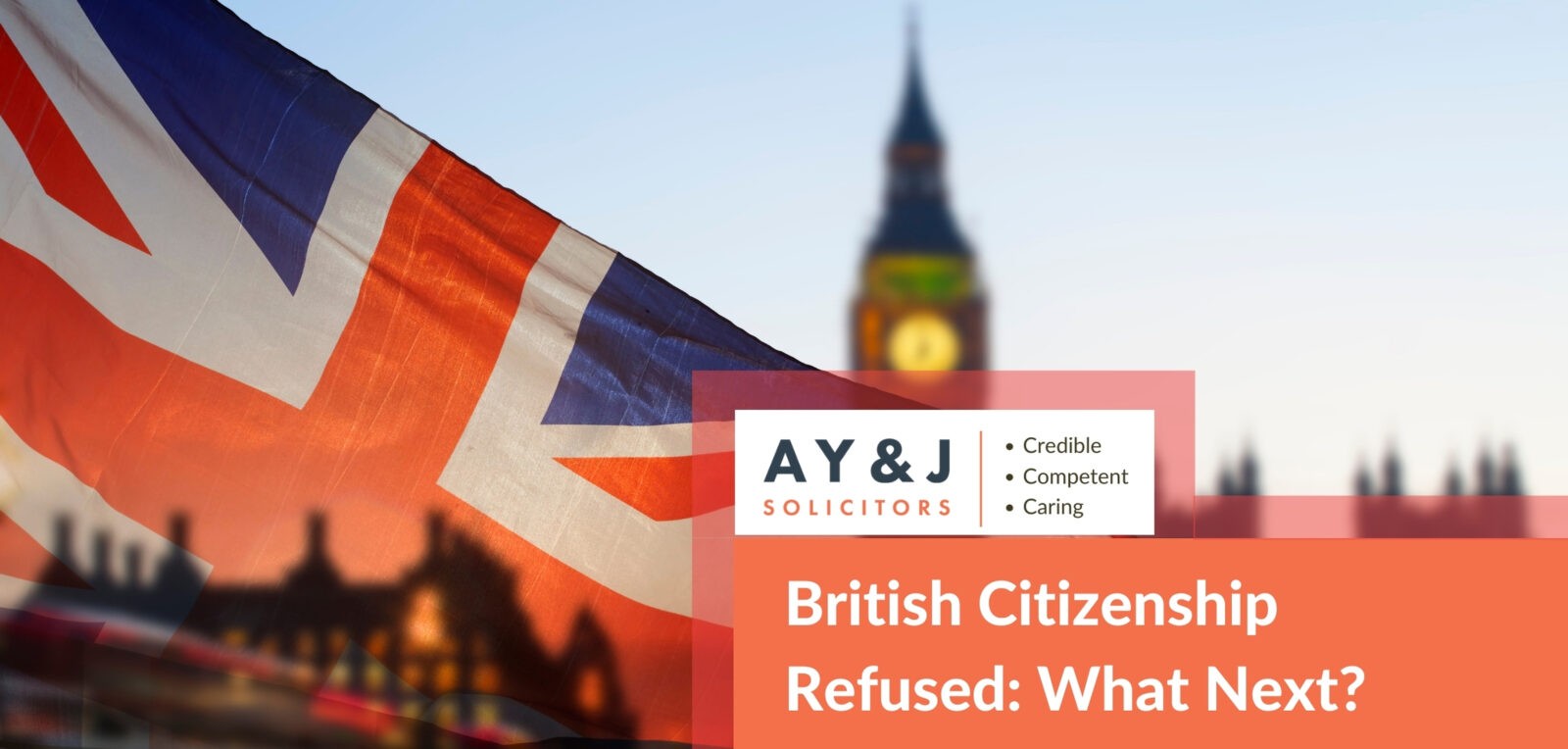Disclaimer: The information in this blog is accurate as of its publication date. Any updates after that date are not reflected here.
The process of securing British Citizenship can be long and challenging and may take years to complete. From start to finish, the process can take years. And at the end of the process, there is no guarantee you will get the outcome you want. Even then, a refusal doesn’t always mean the end – many applicants succeed on review or re-application.
Quick Facts: British Citizenship Refusal
- Around 3% of British Citizenship applications are refused each year — representing thousands of delayed dreams.
- Common reasons for British Citizenship refusal include failing the good character test, not meeting residence or absence limits, or missing Home Office correspondence.
- Unlike other visa routes, there is no right of appeal for a British Citizenship refused decision. If it is a legal or procedural error, the option for a judicial review will be available.
- You can request reconsideration using Form NR, if a mistake was made, or reapply once errors are corrected. Even though there is no statutory deadline, but act promptly and take advice
- Some refusals occur due to past criminal convictions, especially where prison sentences were involved.
- A refusal does not affect your Indefinite Leave to Remain, so you can stay in the UK and prepare a stronger application.
Many people apply for British Citizenship as they want to feel more secure. So when their application is refused, it can be earth-shattering. While a British Citizenship refusal won’t impact your existing Indefinite Leave To Remain status, it is still an expensive and devastating loss.
If you’re facing a British Citizenship refusal and aren’t sure what to do next, we’re here to guide you. Read on to learn more about the common reasons for refusal, what might stand in your way and what steps you can take to put it right.
Table of Contents
What is the refusal rate for British citizenship?
The British citizenship refusal rate has historically been low, with earlier data showing around 3% in 2020 and roughly 2.5% in 2021. More recent Home Office statistics confirm that there were 269,213 grants of British citizenship in the year ending March 2025, and 269,621 grants in the year ending December 2024—about 30% higher than the previous year.
However, the exact British citizenship refusal rate for 2024–2025 has not been clearly published. Based on earlier years, even a 2–5% refusal rate would still mean thousands of people each year face citizenship refusals.
In most cases, the British citizenship refusal rate reflects eligibility errors or missing information rather than outright bans. Many refusals occur due to documentation mistakes or misunderstanding eligibility rules. That said, from 10 February 2025, the updated good character rule means that anyone who previously entered the UK illegally or made a “dangerous journey” will normally be refused, potentially increasing the number of affected applicants.
What can stop you from getting British citizenship?
These are the most common reasons that your British Citizenship application will be refused:
| Category | Common Reasons for British Citizenship Refusal |
| Good Character | Failing to meet the “good character” requirement, including undeclared criminal convictions, previous immigration breaches, or not disclosing relevant information. |
| Residency | Not meeting the residence requirement or spending too many days outside the UK (over 450 days in the past 5 years, or more than 90 days in the last 12 months). |
| Documentation | Failing to respond to Home Office correspondence in time, submitting incomplete or inaccurate information, or missing required evidence. |
| English Language & Life in the UK Test | Not passing or providing valid proof of passing the required tests. |
| Taxes & Financial Compliance | Issues related to unpaid taxes or discrepancies between declared income and HMRC records. |
The good character requirement is tricky because there is so little guidance available for what is and what isn’t acceptable. Often, applicants will be rejected because they have failed to disclose something that is later revealed. Although they might not intend to conceal information, this may be seen as an attempt to hide the truth.
Misunderstanding the requirements is also common. To be eligible, you need to have been resident in the UK for five years before you submit your application. However, there are instances where your time in the UK won’t count towards your Citizenship eligibility. This includes time spent in the UK as a diplomat, as a member of a diplomat’s staff or household, or as a member of visiting armed forces.
You also cannot have extended periods of absence from the UK. You can’t have been outside of the UK for more than 450 days in the past 5 years, or more than 90 days in the last 12 months. Already, you might see why applicants might struggle.
What to do if your application is refused
It can be incredibly disappointing to learn that your British citizenship application has been refused. However, it does not need to be the end of your road to citizenship. You have several options available to you, and understanding what happens if your British citizenship application is denied can help you take the right next steps and reapply for British Citizenship. The best route will depend on the reason given in your refusal letter. That letter should form the basis of your next move.
Step 1: Read the refusal letter
Carefully read the refusal letter straight away. It explains why the decision was made and outlines the reasons for British citizenship refusal. It will also tell you whether you can ask for a reconsideration or whether you should consider reapplying once eligibility is met.
Step 2: Check for a mistake and request reconsideration if appropriate
If you believe a mistake has been made, you can request a reconsideration of the decision. You only have 28 days from the date of your British citizenship refused letter to prepare and submit your request. You will need to demonstrate that one of the following conditions applied to the refusal:
- The caseworker handling your application was negligent in their application of the law.
- The caseworker did not properly consider all the documents that were in their possession.
- The caseworker made a decision before giving enough time for external enquiries to be completed.
Step 3: If you are simply ineligible, wait until the criteria are met and then reapply
If the refusal was because you did not meet the eligibility rules, you can correct the issues and reapply when you meet the requirements. For example, you may need to address residence or absence issues, provide missing documentation, or meet the good character requirement before submitting a new application. This is often the case when British citizenship is refused due to avoidable mistakes.
Step 4: Seek legal advice before reapplying
Before you reapply, seek legal advice. An immigration law professional can help you understand what happens if my citizenship application is refused, decide whether to request reconsideration, and ensure your next application avoids previous errors. A professional can also prepare a strong and comprehensive submission that increases your chances of success.
Other options
You can also withdraw your application and continue living in the UK with Indefinite Leave to Remain if that is appropriate for your circumstances.
If you’re wondering, “If my citizenship application is denied, can I apply again?” the answer is yes — once the issues that caused the refusal are corrected. We can help you prepare a professional and thorough reapplication to reduce the risk of another British citizenship refused outcome.
Can you reapply for British citizenship?
You will be told in your application refusal if you are eligible to re-apply. If you’re wondering, “If my citizenship application denied, can I apply again?”, the answer is yes, but you must make sure not to repeat the same mistakes that led to your British citizenship refused outcome. If your British citizenship application is refused because you did not meet the residence requirement, you may need to wait up to 12 months (or until you meet the full 5-year residency and absence limits) before reapplying.
If you are considering re-applying, we recommend seeking professional advice for your follow-up application. We can help to ensure that your application is prepared professionally, in line with all regulations and free from errors. The cost of applying for British Citizenship is very high, so you don’t want to repeat the same mistakes again and risk another refusal.
It may be that you don’t currently meet the residence requirements and you need to stay in the UK for a little longer to meet all eligibility criteria. We can advise on the best time to apply and also make sure that there are no errors in your application that could cause issues.
Can you appeal British Citizenship refusal?
No, there is no right to appeal when it comes to a British citizenship decision letter. Unlike visa refusals, there is no tribunal appeal process for a British citizenship refused outcome — the only available routes are requesting a reconsideration or submitting a fresh application.
Since this is considered a privilege and not a right, you can’t appeal on human rights grounds. The majority of refusals are the result of failing to meet the “good character” requirement, and this is a vague and subjective measure at best. Another reason that there is no right to appeal is that it will not impact your ability to continue living and working in the UK. Your right to family and private life won’t be impacted, so you cannot submit a human rights claim.
In limited cases, if you believe there has been a clear legal or procedural error in your British citizenship decision letter, you may consider applying for a judicial review. This allows a court to examine whether the Home Office acted lawfully in making the decision.
This is actually good news for applicants, as it means you won’t be locked in a lengthy and expensive appeals process. You can either apply for the decision to be reconsidered, resubmit your application, or accept that you cannot secure British Citizenship.
What is the 7 Year Rule?
There is no seven year rule for British citizenship. The phrase usually refers to the seven year child route in the immigration rules, which is about getting permission to stay in the UK, not about becoming a citizen. Under Appendix Private Life, a child who has lived in the UK continuously for seven years can qualify for permission to stay where it would not be reasonable to expect the child to leave. This can place the family on a route to settlement, which can later support a citizenship application once all nationality requirements are met.
For citizenship specifically, children often use registration routes in the British Nationality Act. The most common are registration after ten years’ residence in the UK from birth, and discretionary registration where officials consider the child’s best interests and evidence of strong ties to the UK. Seven years of residence can be a helpful indicator of integration, but it is not an automatic rule for citizenship.
Tips to Avoid Refusal
Use this practical checklist to reduce avoidable risks.
- Pass required tests early
Confirm you meet the English language requirement and pass the Life in the UK Test before you apply. This avoids last minute delays or missing evidence. See the current Home Office guides for what to submit and how to prove it.
- Keep travel within the absence limits
For applications based on five years’ residence, total absences should not exceed 450 days and absences in the final year should not exceed 90 days. For applications based on three years’ residence, the totals are 270 and 90. Limited discretion exists in defined circumstances, so record all trips accurately and plan timing around these limits.
- Declare all convictions and any immigration issues
You must disclose all criminal convictions, including spent convictions, and be ready to explain any immigration breaches. From 10 February 2025, applications that involve illegal entry will normally be refused under the good character policy. Provide full and honest disclosures with supporting evidence.
- Provide complete and consistent documents
Follow the application guide closely. Include identity documents, proof of residence, travel records, tax and employment evidence where relevant, and the correct referees. Incomplete or inconsistent evidence is a common reason for refusal or delay.
What can stop you from getting British citizenship?
There are some criminal convictions that will prevent you from ever securing British Citizenship. This is because you will always fail the “good character” test, regardless of how long it has been since the offence. If you have been convicted of a crime and given a custodial sentence, it is likely that your application will be refused until a certain amount of time has passed.
| Sentence | Application will be refused until: |
| Custodial sentence between 1-4 years | 15 years from the end of your full sentence, including time on licence |
| Custodial sentence up to 1 year | 10 years from the end of your full sentence, including time on licence |
| Non custodial sentence (including a suspended sentence) | 3 years from the date of conviction |
| Caution | 3 years from the date of the caution |
For any convictions that resulted in a sentence over 4 years, it is unlikely that you will ever be granted citizenship. If you demonstrate a pattern of repeat offences, you are also unlikely to secure citizenship. And finally, serious sexual offences are likely to prevent you from ever securing British Citizenship.
How can A Y & J Solicitors help?
A Y & J Solicitors is a specialist immigration law firm with extensive experience with British Citizenship applications and refusals. We have an in-depth understanding of immigration law and are professional and results-focused. For assistance with your visa application or any other UK immigration law concerns, please contact us on +44 20 7404 7933 or contact us today. We’re here to help!










